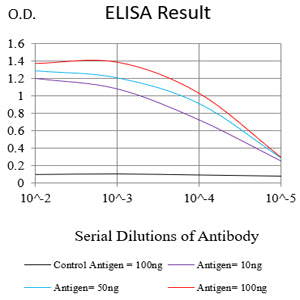
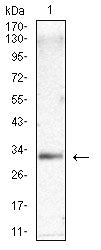
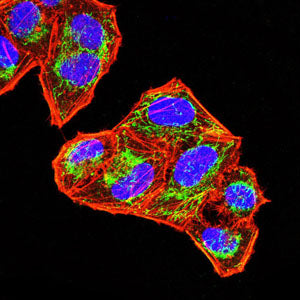
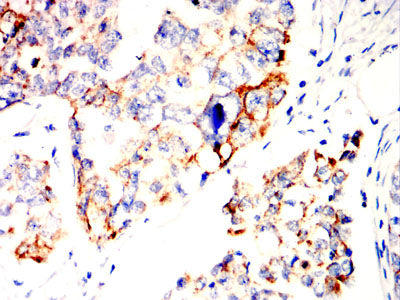
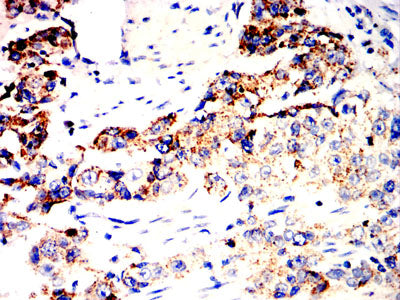
| WB | 1/500 - 1/2000 | Human,Mouse,Rat |
| IF | 咨询技术 | Human,Mouse,Rat |
| IHC | 1/200 - 1/1000 | Human,Mouse,Rat |
| ICC | 1/200 - 1/1000 | Human,Mouse,Rat |
| FCM | 1/200 - 1/400 | Human,Mouse,Rat |
| Elisa | 1/10000 | Human,Mouse,Rat |
| Aliases | CIS3; SSI3; ATOD4; Cish3; SSI-3; SOCS-3 |
| Entrez GeneID | 9021 |
| clone | 3A10A12 |
| WB Predicted band size | 24.8KDa |
| Host/Isotype | Mouse IgG1 |
| Antibody Type | Primary antibody |
| Storage | Store at 4°C short term. Aliquot and store at -20°C long term. Avoid freeze/thaw cycles. |
| Species Reactivity | Human |
| Immunogen | Purified recombinant fragment of human SOCS3 (AA: full(1-225)) expressed in E. Coli. |
| Formulation | Purified antibody in PBS with 0.05% sodium azide |
+ +
以下是关于SOCS3抗体的3篇代表性文献示例(文献信息为示例性质,请通过学术平台核实原文):
---
1. **文献名称**:*Suppressor of cytokine signaling-3 is a key regulator of the pro-inflammatory response in human macrophages*
**作者**:Yasukawa H. et al.
**摘要**:本研究利用SOCS3特异性抗体,揭示了SOCS3通过抑制JAK-STAT信号通路负调控巨噬细胞中IL-6等促炎因子的产生,为炎症性疾病治疗提供靶点。
2. **文献名称**:*SOCS3 deficiency in myeloid cells promotes obesity-induced inflammation and insulin resistance*
**作者**:Lavine S.D. et al.
**摘要**:通过SOCS3抗体检测小鼠模型中的蛋白表达,发现髓系细胞中SOCS3缺失会加剧肥胖相关炎症和胰岛素抵抗,证实其在代谢调控中的关键作用。
3. **文献名称**:*SOCS3 overexpression drives STAT3 signaling suppression and enhances chemosensitivity in leukemia cells*
**作者**:He B. et al.
**摘要**:利用SOCS3抗体进行Western blot分析,证明过表达SOCS3可通过抑制STAT3磷酸化增强白血病细胞对化疗药物的敏感性,提示其作为癌症治疗标志物的潜力。
---
**建议**:可通过PubMed或Google Scholar检索关键词“SOCS3 antibody”、“SOCS3 function”获取最新文献,并注意选择高引用研究或权威期刊论文以保障可靠性。
SOCS3 (Suppressor of Cytokine Signaling 3) antibodies are essential tools for studying the regulation of cytokine signaling pathways in cellular and molecular research. SOCS3 is a member of the SOCS family, which negatively regulates the JAK-STAT signaling cascade by binding to cytokine receptors or JAK kinases, targeting them for proteasomal degradation. It plays a critical role in modulating immune responses, inflammation, and cancer progression. SOCS3 antibodies are widely used in techniques like Western blotting, immunohistochemistry (IHC), immunofluorescence (IF), and flow cytometry to detect SOCS3 protein expression levels, localization, and interactions in various biological samples.
These antibodies are typically raised against specific epitopes of human or mouse SOCS3. with monoclonal and polyclonal variants available. Monoclonal antibodies offer high specificity, while polyclonal antibodies may provide broader detection across species. Researchers utilize SOCS3 antibodies to explore its involvement in diseases such as cancer (e.g., tumor suppression or oncogenic roles), autoimmune disorders, and metabolic conditions like obesity and insulin resistance. Challenges in working with SOCS3 antibodies include low endogenous protein expression in certain tissues, potential cross-reactivity with other SOCS family members (e.g., SOCS1 or SOCS2), and variability due to post-translational modifications. Proper validation using knockout controls or siRNA-based knockdown is critical to ensure specificity. Commercial SOCS3 antibodies often cite applications in both normal and pathological contexts, emphasizing their utility in uncovering mechanisms of cytokine signaling dysregulation.
×